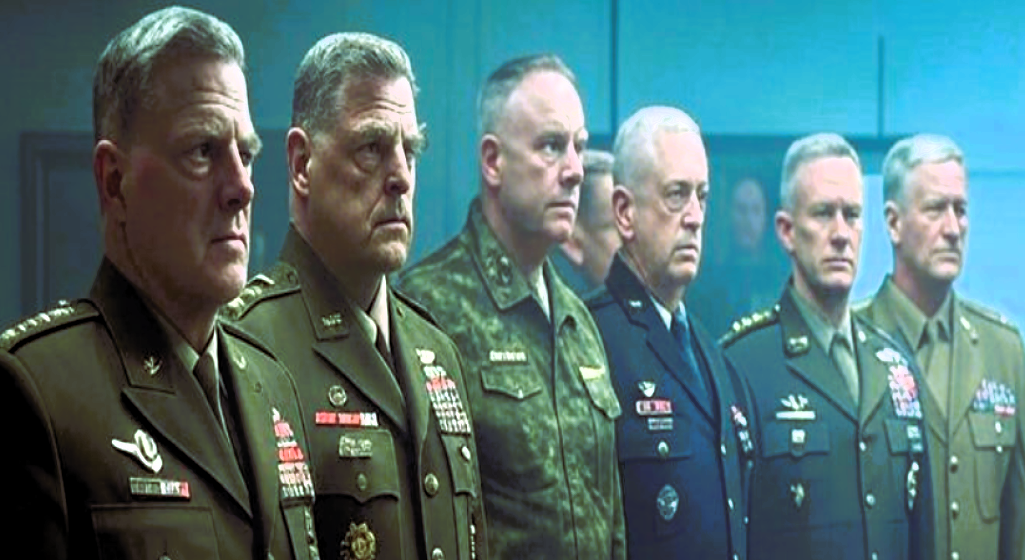Court-Martial Exposed: Contempt and Consequence – The Case for Court-Martialing Insubordinate Flag Officers
Ready to uncover the truth? Sick of the lies? Join our Telegram Channel now. It’s time for the real story! Stay informed! My gratitude to all my readers!
COURT MARTIAL: Retired flag officers who denounce the President and Secretary of Defense—let alone brand them as the next Hitler or a threat to democracy—violate the UCMJ. SecDef Hegseth must hold them accountability.
Amuse Report: The Uniform Code of Military Justice is not an antiquated relic; it is the bedrock of military discipline and the safeguard of democratic governance. It now stands as the last barrier between order and chaos as Secretary of Defense Pete Hegseth faces a defining test. The issue at hand is not a minor breach of protocol—it is a blatant insubordination that strikes at the heart of civilian control over the military.
Certain retired flag officers have violated Articles 88 and 133 with reckless impunity, and the only question that remains is whether this administration will have the resolve to restore discipline. If these officers are not held accountable, the implications are dire: the erosion of civilian authority, the unchecked defiance of military elites, and a crisis of governance that imperils the Republic itself. The UCMJ is unambiguous: retirees remain subject to its jurisdiction, and their calculated insubordination is a threat that must be met with decisive action.
To understand the necessity of these court-martials, one must first examine the governing statutes. Article 88 explicitly prohibits commissioned officers from using “contemptuous words” against the President. The intent of this article is clear: military officers, entrusted with the nation’s defense, must remain apolitical in their conduct, their fealty bound to the Constitution and the chain of command rather than personal grievances.
Article 133, which addresses conduct unbecoming an officer, extends beyond overt insubordination, encompassing actions and statements that erode the dignity and discipline expected of senior military leaders. The retired officers who have engaged in public, venomous attacks against President Trump and Secretary Hegseth have violated both.
These officers are not mere commentators or private citizens exercising their First Amendment rights unencumbered. They are retired generals and admirals who continue to receive government pensions, a reminder that they remain, in legal terms, part of the armed forces. They enjoy privileges from their service, from security clearances to advisory roles, yet they have weaponized their prominence to undermine the legitimacy of a duly elected president. This is not about policy disagreements; this is about a cadre of military elites who believe they are above the democratic system they swore to defend. Their public statements, laden with disdain and outright contempt, have emboldened insubordination among the ranks, threatening good order and discipline.
One of the most egregious examples is that of retired General James Mattis. His public letter in 2020, in which he excoriated President Trump as a divisive leader who “does not even pretend to try” to unite the country, was a blatant violation of Article 88. While cloaked in the language of statesmanship, Mattis’s words were intended to delegitimize the Commander-in-Chief in the eyes of the armed forces. He was not alone. Admiral Mike Mullen, another former Chairman of the Joint Chiefs, claimed he was “sickened” by Trump’s use of military force to quell violent riots, a remark that cast doubt on the administration’s lawful exercise of authority.
Admiral William McRaven went so far as to declare that Trump was “destroying” the country, an inflammatory statement unbecoming of an officer and clearly contemptuous under the UCMJ.
Other notable examples include General John Allen called Trump’s leadership “the beginning of the end of American democracy.” General Martin Dempsey publicly warned against the use of troops domestically, a direct rebuke of the Commander-in-Chief’s authority. General Colin Powell declared that “Trump lies” and had “drifted away from the Constitution.”
General Stanley McChrystal labeled Trump “immoral” and untruthful. General John Kelly openly questioned Trump’s character and honesty. These statements were not policy critiques; they were outright attacks on the legitimacy of civilian leadership.
The contempt did not cease with Trump’s presidency. These same figures, along with General Mark Milley, continued their insubordination by directing their ire toward Secretary Hegseth, undermining his authority before he had even begun his tenure. Milley, who served as Chairman of the Joint Chiefs under Trump, has reportedly called the new Secretary of Defense “unfit for command,” a direct attack that carries the weight of his former office. General Barry McCaffrey questioned Hegseth’s judgment and ethics, while General Lloyd Austin rebuked Hegseth’s stance on women in combat, declaring “enough already.” Major General William Enyart dismissed Hegseth as “spectacularly unqualified.” These are not mere critiques of policy but attempts to delegitimize the administration’s authority.
The result? A Pentagon where senior officers feel emboldened to openly question the legitimacy of their civilian overseers. The military is not a debating society. It is an institution predicated on hierarchy, order, and unwavering discipline. If those at the highest echelons of command believe they can openly defy civilian leadership without consequence, what message does that send to the lower ranks?
This is not a slippery slope argument; it is a reality already unfolding. Recent reports indicate an increase in officers speaking out against administration policies, citing the precedent set by these retired flag officers. The failure to act decisively now will only exacerbate this problem. A military that allows its senior leaders—active or retired—to publicly attack the legitimacy of its Commander-in-Chief is a military on the path to lawlessness. Today, it is public letters and interviews. Tomorrow, it is coordinated disobedience.
Some will argue that court-martialing retired officers for their words is excessive, even authoritarian. This is nonsense. The precedent for disciplining retired officers is well-established. For example, in 1921, retired Major General Peter C. Harris was reprimanded for public criticisms of the War Department. More recently, in 2010, retired Army Brigadier General Janis Karpinski was demoted for conduct unbecoming an officer.
The UCMJ applies to them for this very reason: to ensure that their conduct does not degrade the integrity of the military. To suggest that Mattis, Mullen, McRaven, Milley, and their ilk should be exempt is to assert that senior officers deserve privileges that the rank-and-file do not. A private in the Army who publicly called the President a “threat to the Constitution” would face swift disciplinary action. That generals have been able to say as much, and worse, without consequence is an injustice that must be rectified.
The enforcement of Articles 88 and 133 against these individuals is not a matter of retribution; it is a matter of maintaining discipline, ensuring respect for the chain of command, and upholding the principle that military leaders serve under civilian authority. The Biden administration turned a blind eye to the contemptuous rhetoric from these figures because it was politically expedient. The Trump administration must not repeat that mistake. If Secretary Hegseth allows these violations to go unpunished, he will not only undermine his own authority but embolden future insubordination. These men must be made an example of. The future of civilian-military relations depends on it.
ARTICLE SOURCE: https://x.com/amuse/status/1894411575869522257








![CODE RED: RFK JR. DETONATES THE WHO! GLOBAL CALL TO SHUT IT DOWN — SOVEREIGNTY OR SLAVERY, THE CHOICE IS NOW [WATCH NOW]](https://amg-news.com/wp-content/uploads/2025/05/RFK-Jr-World-Health-Organization-450x228.png)
![NATIONAL SECURITY SCANDAL: BIDEN PUT AMERICANS ON TERROR WATCH LISTS — TULSI GABBARD CONFIRMS: SPEAK OUT, GET FLAGGED — IT’S CRIMINAL, AND THEY MUST BE JAILED [VIDEO]](https://amg-news.com/wp-content/uploads/2025/05/BIDEN-PUT-AMERICANS-ON-TERROR-WATCH-LISTS-450x250.png)
![BOOM! RFK JR.’S SECRET BLUE ELIXIR EXPOSED — THE BRAIN-HACKING FORMULA THAT UNLEASHES ENERGY, FOCUS & LONGEVITY [VIDEO]](https://amg-news.com/wp-content/uploads/2025/02/RFK-Jr.s-Mind-Blowing-Performance-Hack-450x300.png)
![HISTORIC DECREE FROM THE OVAL OFFICE: EXECUTIVE ORDER — TRUMP WIPES OUT JUNK SCIENCE, GOLD STANDARD IS NOW LAW [VIDEO]](https://amg-news.com/wp-content/uploads/2025/05/EXECUTIVE-ORDER-450x217.jpg)

1 Comment
they took an oath to the constitution. they need to pay for violating their oath. treason, court martial, they all add up to being anti american.